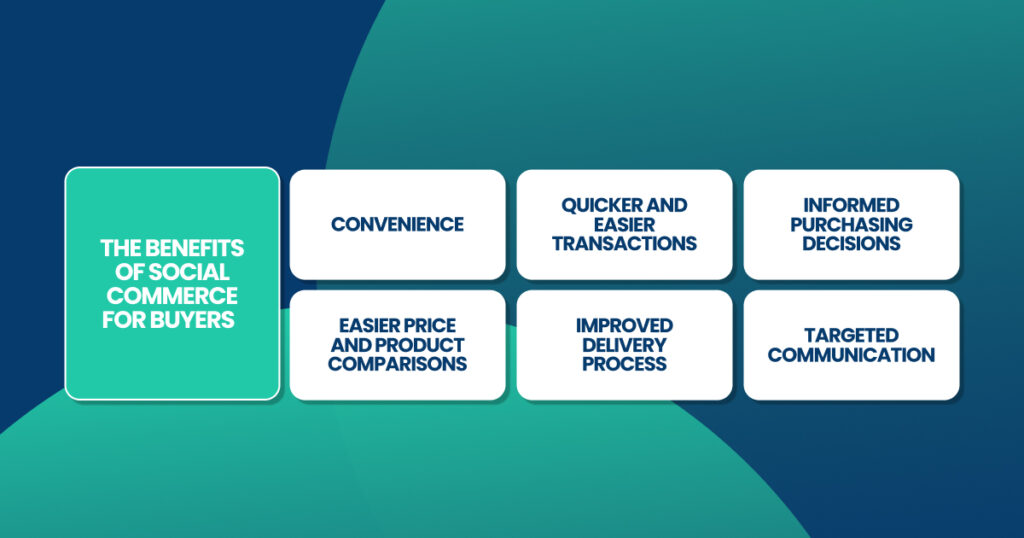Social commerce is revolutionizing how we shop by blending the social media experience with the ease of online shopping.
Of course, e-commerce marketing is the lifeblood of it.
It encompasses all the strategies and tactics used to get traffic to your website, convert that traffic into paying customers, and ultimately retain those customers for long-term success.
According to Statista, revenues in this segment are forecast to surpass one trillion dollars in the latter year, with an expected compound annual growth rate (CAGR) of 13.7 percent from 2023 to 2028.
Source: Statista
The blog post will simplify Social Commerce and how it benefits your daily life by highlighting the essential strategies and methods for boosting online sales.
What is Social Commerce?
Social commerce is the mixture of social media platforms with e-commerce, enabling users to discover, share, and purchase products immediately through social media channels.
This innovative approach blends the easiness of online shopping with the interactive essence of social media, creating a seamless experience for consumers.
Social commerce transforms social media platforms like Facebook, Instagram, Pinterest, and TikTok into powerful sales channels, enabling businesses to reach and engage the target audience in new and dynamic ways.

Source: Statista
Benefits of Social Commerce
Social commerce offers numerous benefits that can significantly enhance our lives and business operations.

Social commerce provides consumers with a more interactive and personalized shopping experience.
It allows users to discover products through social networks, read reviews, and even make purchases without leaving the platform.
This convenience can lead to quicker decision-making and a more enjoyable shopping experience.
Source: Statista
For businesses, social commerce offers direct access to a vast audience of active users already engaging with content on social media platforms.
It allows for targeted marketing efforts, more personalized customer interactions, and the use of user-generated content to build trust and authenticity.
By integrating shopping into social media, businesses can shorten the sales funnel, increase conversion rates, and drive more sales.
The Synergy of E-commerce and E-commerce Marketing
E-commerce and E-commerce marketing are interdependent elements that form the backbone of modern online business operations.
It is expected that U.S. online retail sales of physical goods are projected to reach close to $476.5 billion in 2024.

The Importance of E-commerce Marketing for the Industry lies in the following factors:
- Increased Online Visibility: It enhances the visibility of online stores, making it easier for potential customers to find them through search engines and social media platforms.
- Customer Acquisition: This helps attract new customers, driving traffic to online stores.
- Building Brand Awareness: Consistent and strategic marketing efforts help establish and strengthen brand identity.
- Driving Sales and Revenue: Effective marketing strategies, such as discounts, special offers, and upselling, encourage customers to purchase.
Developing a Strong Social Commerce Strategy
Developing a robust social commerce strategy is essential for businesses that want to maximize online sales and effectively engage with their audience.
To create a productive strategy, businesses need to consider several vital actions, align their efforts with the latest social commerce trends, and leverage the unique features of each social media platform.
Identifying Your Target Audience and Goal
Understanding your target audience is vital for each social commerce strategy.
Conduct thorough research to understand your potential customers’ demographics, interests, and behaviors.
Apply to social media analytics tools to gain insights into your audience’s preferences and tailor your content marketing accordingly.
Knowing your audience enables you to create personalized and relevant experiences that resonate with potential buyers.
The difference between a booming business and a silent storefront is knowing exactly who you aim for and what you want to achieve.
Here’s why identifying your target audience and setting clear goals are crucial for success:
- Tailored Marketing Magic: Understanding your ideal customer’s demographics, interests, and online behavior allows you to craft targeted marketing messages that resonate.
Imagine promoting luxury skincare products to teenagers; it likely wouldn’t yield many sales. By targeting your audience, you can tailor your approach for maximum impact.
- Laser-Focused Products and Services: A defined target audience helps you curate a product selection that caters to their needs and preferences.
Think of it this way: if you’re targeting athletes, you wouldn’t stock your store with evening gowns. Focusing on your ideal customer ensures you offer products that resonate with them.
- Goals that Guide Your Journey: Setting clear goals provides a roadmap for your e-commerce journey. Do you aim to increase brand awareness, boost sales, or capture a specific market share?
Having defined goals enables you to measure your progress, track the effectiveness of your marketing efforts, and make adjustments along the way.
For example, you might prioritize social media engagement over immediate sales to increase brand awareness.
Choosing the Right Social Media Platforms
Not all social media platforms are considered equal, and different platforms attract different audiences. Choose the platforms that match your target audience and business objectives.
For instance, Instagram and Pinterest are ideal for visually-driven products, while Facebook offers robust advertising options and community-building features.
With its younger user base, TikTok is perfect for trendy and engaging content.
Each social media platform has its special user data, features, and strengths, making it essential to choose the ones that best suit your target audience and business objectives.
To decide which platforms are best for your e-commerce strategy, start by analyzing the demographics and behaviors of your potential customers.
Strategies within this subcategory include:
- Audience Analysis: Conduct thorough research to understand where your target customers spend their time online. Apply social media analytics tools to gather data on user demographics, interests, and engagement patterns.
- Content Alignment: Choose platforms that complement the type of content you create. For example, if your products are highly visual, platforms that stress photos and videos, such as Instagram and Pinterest, will be more effective.
- Engagement Features: Consider the unique features each platform offers. Instagram’s shoppable posts, Facebook’s extensive advertising options, and TikTok’s viral potential can be leveraged to enhance your social commerce strategy.
- Competitor Insights: Analyze which platforms your competitors are using effectively. This can offer insights into where your target audience might be active and responsive.
Mastering SEO Skills
In the bustling e-commerce marketplace, where online stores compete for a sliver of consumers’ attention, search engine optimization (SEO) acts as a silent but powerful magnet, attracting potential customers directly to your virtual doorstep.
Unlike social media followers, who might come across your brand by chance through a friend’s post, SEO ensures your online store appears at the top of search engine results pages (SERPs) when users actively search for products you offer.
Imagine the difference between having a social media storefront tucked away on a side street and occupying prime real estate on the main avenue—that’s the power of SEO in a nutshell.
Business owners should apply SEO tools and strategies because they offer long-term benefits that can significantly impact their bottom line.
Keyword Research: Identifying the terms and phrases that prospective customers use when looking for products similar to yours.
Tools like Google Keyword Planner, SEMrush, and Ahrefs can help you find relevant keywords with high search volume and low competition.
On-Page Optimization: Ensuring your website’s pages are optimized for search engines. This includes using relevant keywords in titles, meta descriptions, headers, and product descriptions and optimizing images with alt text.
Technical SEO: Improve your website’s technical aspects to enhance its performance and crawlability through search engines. This includes optimizing site speed, ensuring mobile-friendliness, and creating an XML sitemap.
Link Building: Getting high-quality backlinks from reputable websites to improve your site’s authority and ranking in search results.
One of the primary benefits of SEO is attracting organic traffic. Unlike paid advertising services, which require ongoing investment, organic traffic is driven by strong.
SEO methods can provide a steady stream of visitors to your online store at no additional cost.
SEO also complements your social media efforts.
While having substantial social media followers is beneficial, it’s important to remember that not all potential customers will discover your business through social media platforms alone.
Accepting SEO with your social media strategy can enhance your online presence across multiple channels.
Optimizing your social media posts and profiles for relevant keywords can improve their visibility in search results, attracting more followers and driving traffic to your social media storefront.
Social Media in E-Commerce
Social media services in e-commerce have revolutionized how businesses relate with their customers, market their products, and drive sales.
Social media platforms like Facebook, Instagram, Pinterest, and TikTok have become integral components of e-commerce strategies, offering businesses unique opportunities to engage with their audience in real-time.
The importance of social media in e-commerce cannot be overstated; it is a powerful tool for brand awareness, customer engagement, and direct sales. Here’s why and how businesses can effectively target these platforms:
Firstly, social media enables businesses to reach a vast audience of potential customers. With billions of active consumers across various platforms, businesses can apply social media to increase their visibility and attract a diverse customer base.
By creating and disseminating engaging content, businesses can capture users’ attention and convert them into devoted customers. Social media also offers valuable insights into customer inclinations and behaviors, enabling businesses to customize their marketing approaches to more effectively meet the needs of their target audience.
To effectively target social media platforms, businesses should start by identifying where their target audience spends their time.
For example, younger audiences may be more active on TikTok and Instagram, while older demographics might prefer Facebook.
Social media analytics tools can assist businesses in understanding their audience’s preferences and engagement patterns, allowing them to create content that goes with their followers.
Key benefits of using social media in e-commerce include:
- Increased Brand Awareness: Social media platforms enable businesses to introduce their products and tell their brand story. Regularly posting content keeps the brand top-of-mind for followers.
- Customer Engagement: Social media enables two-way communication between businesses and customers. Businesses can build strong relationships and a sense of community by responding to comments, messages, and reviews.
- Direct Sales: Social commerce features like shoppable posts and stories enable users to purchase products directly from their social media feeds, simplifying the buying process and increasing conversion rates.
- Data-Driven Insights: Social media platforms offer robust analytics tools that provide insights into customer behavior, engagement rates, and campaign performance. These insights help businesses refine their strategies and improve their marketing efforts.
- Cost-Effective Advertising: Social media advertising enables businesses to precisely target specific demographics, ensuring that their ads reach the most relevant audience. This targeted approach can result in a higher return on investment (ROI) than traditional advertising.
Leveraging User-Generated Content
User-generated content (UGC) is a great tool in social commerce Motivate your customers to disseminate their experiences with your products on social media. UGC provides authentic content that builds trust and creates a sense of community around your brand.
Highlighting UGC on your social media profiles and website can influence potential customers’ purchasing decisions.
Creating Engaging Content
Social media content must be engaging and relevant to attract and retain customers.
Apply high-quality images and videos to showcase your products, create informative posts, and share behind-the-scenes content to humanize your brand.
Multimedia content such as polls, quizzes, and live videos can boost engagement and interest your audience.
Utilizing Influencer Marketing
Influencer marketing is a core component of a successful social commerce strategy. Collaborating with influencers who matches with your brand can assist you reach a larger audience and gain credibility.
Source: Hubspot
Influencers can create authentic content that showcases your products in real-life scenarios, driving more organic traffic to your social media profiles and online store.
Finding the Right Influencers
When selecting influencers, consider their relevance to your brand, engagement rates, and follower demographics. Micro-influencers, with smaller but highly engaged audiences, can often provide more value than celebrities with millions of followers.
Use influencer marketing platforms to find and connect with suitable influencers for your campaigns.
Embracing Social Commerce Trends
Staying up-to-date with social commerce trends is essential for maintaining a competitive edge. Here are some current trends to watch:
Shoppable Posts and Stories
Platforms like Instagram and Facebook suggest shoppable posts and stories, enabling users to purchase products directly from their feeds. Businesses should utilize these features to create a seamless shopping experience and drive conversions.
Livestream Shopping
Livestream shopping combines entertainment with e-commerce, enabling brands to showcase products in real time and interact with viewers.
Platforms like Instagram Live, Facebook Live, and TikTok Live are ideal for hosting live shopping events. This trend is particularly popular in Asia and is gaining traction globally.
Augmented Reality (AR)
AR technology enhances the online shopping experience by enabling users to try on products such as clothing, accessories, and makeup virtually. Integrating AR into your social commerce strategy can reduce return rates and increase customer satisfaction.
Integrating Social Commerce with Digital Marketing
Social commerce should be an integral part of your broader digital marketing strategy. Here’s how to integrate the two effectively:
Cross-Promoting Content
Promote your social commerce content across all digital marketing channels, including the services of email marketing, search engine marketing, and your website.
Cross-promotion increases the visibility of your social commerce efforts and drives traffic from multiple sources.
Analyzing Data and Metrics
Use data analytics services and tools to track the performance of your social commerce campaigns.
Monitor metrics such as engagement, click-through, and conversion rates to evaluate what works and doesn’t. Use this data to refine your strategy and optimize your marketing efforts.
Building Trust and Credibility
Digital marketing helps build trust and credibility, vital for transforming potential customers into buyers. Apply to customer reviews, testimonials, and case studies to single out the positive experiences of your existing customers.
Social Proof
Social proof, such as user-generated content and influencer endorsements, reinforces the credibility of your brand and encourages new customers to make a purchase.
Partner with [A] Growth
Do you want to revolutionize your approach to E-commerce and drive your business towards growth? [A] Growth Agency is with you!
We suggest a comprehensive range of growth marketing services to meet your unique business needs.
From identifying your target audience to implementing advanced SEO tactics and managing your social media platforms, we guarantee your brand stands out in a crowded market.
We don’t believe in one-size-fits-all solutions.
We create customized marketing plans that align with your specific business objectives and target market, ensuring your marketing efforts are effective and efficient.

